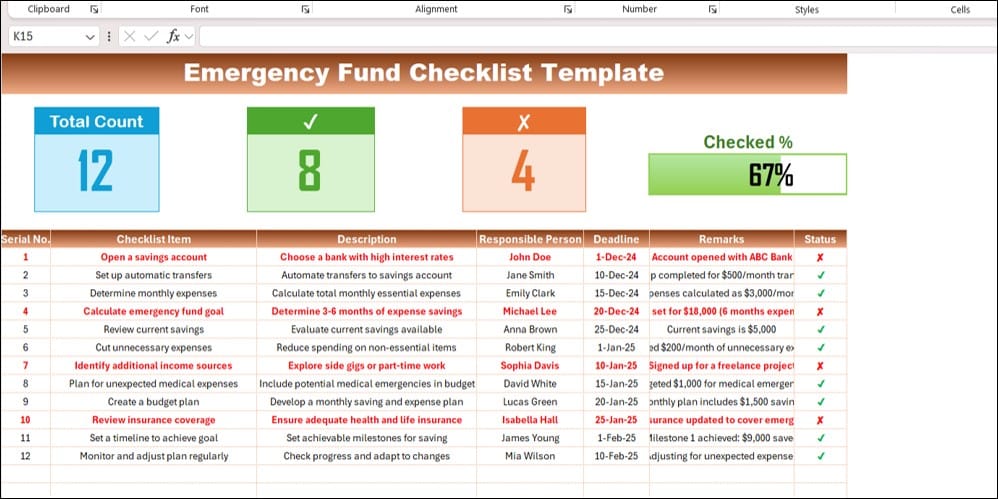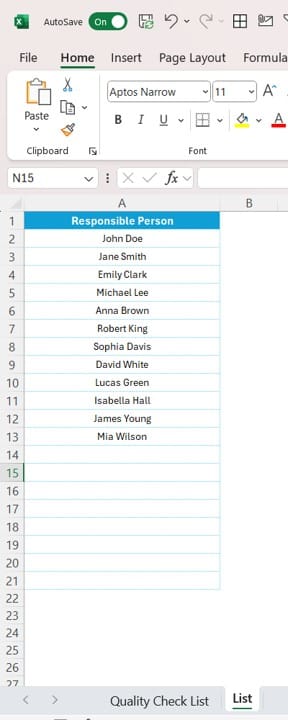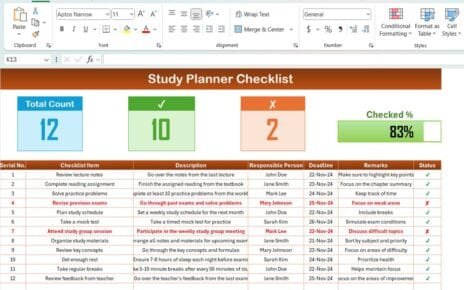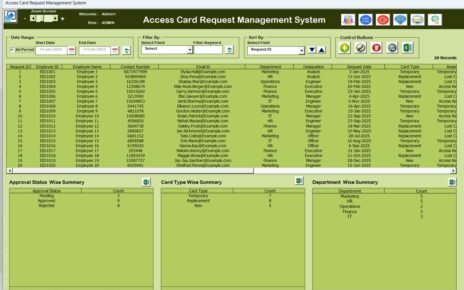An emergency fund is a financial safety net that ensures you’re prepared for unexpected situations, like job loss, medical emergencies, or other unforeseen expenses. To make this process more manageable and organized, we’ve created an Emergency Fund Checklist Template in Excel. This article will guide you through its features, benefits, best practices, and how to use it effectively.
Click to Emergency Fund
Why Use an Emergency Fund Checklist Template?
Managing your emergency fund can seem overwhelming without a structured approach. This template provides an easy-to-use system to track tasks, monitor progress, and ensure nothing gets overlooked. Whether you’re setting up your fund for the first time or revisiting your financial safety net, this tool will simplify the process.
Key Features of the Emergency Fund Checklist Template
Our Emergency Fund Checklist Template is thoughtfully designed to cover all essential aspects of building and maintaining an emergency fund. It consists of two worksheets:
Emergency Fund Checklist Sheet Tab

- This is the primary worksheet where you’ll input and track your checklist information.
Top Section
Click to Emergency Fund
At the top of this sheet, you’ll find three summary cards:
- Total Count: The total number of checklist items.
- Checked Count: The number of completed tasks (✔).
- Crossed Count: The number of pending tasks (✘).
- Progress Bar: A visual representation of your progress in percentage terms.
Checklist Table
- The main table is the heart of this sheet. Here’s what you’ll track:
- Serial No.
- Checklist Item
- Description
- Responsible Person
- Deadline
- Remarks
- Status (✔ or ✘)
List Sheet Tab

- This worksheet stores a unique list of Responsible Persons for use in dropdowns in the main checklist. This feature simplifies data entry and ensures consistency.
Click to Emergency Fund
Advantages of the Emergency Fund Checklist Template
- Streamlined Task Management: The template breaks down the process into manageable steps, making it easy to follow and track.
- Progress Monitoring: The progress bar and summary cards provide a quick overview of your completion status, motivating you to stay on track.
- Customizable Fields: You can tailor the checklist items, deadlines, and responsible persons to suit your needs.
- Improved Collaboration: Assign responsibilities to specific team members or family members, ensuring everyone contributes effectively.
Best Practices for Using the Emergency Fund Checklist
Click to Emergency Fund
- Start Small and Stay Consistent: Begin with a modest savings goal and gradually increase it. Regular contributions, no matter how small, add up over time.
- Automate Where Possible: Use automatic transfers to make saving effortless. Set a fixed amount to be transferred to your savings account each month.
- Review Regularly: Schedule monthly or quarterly reviews of your emergency fund. Update the checklist based on your current financial situation.
- Set Realistic Deadlines: Assign achievable deadlines for each task to ensure steady progress without feeling overwhelmed.
- Collaborate and Communicate: If multiple people are involved, clearly communicate roles and responsibilities to avoid confusion.
Common Mistakes to Avoid
- Ignoring Small Expenses: Neglecting to account for minor, irregular expenses can lead to underfunding your emergency savings.
- Setting Unrealistic Goals: Overly ambitious savings targets can lead to frustration. Break larger goals into smaller milestones.
- Not Updating the Checklist: Regular updates ensure the checklist remains relevant and aligned with your current needs.
Advantages of Using Excel for an Emergency Fund Checklist
Click to Emergency Fund
- Ease of Use: Excel offers a user-friendly interface that most people are familiar with.
- Flexibility and Customization: You can easily modify the template to include additional columns or features.
- Data Visualization: Features like progress bars and summary cards make it easier to interpret your data at a glance.
- Accessibility: Share the file with others or save it to a cloud storage service for easy access on the go.
Conclusion
An Emergency Fund Checklist Template in Excel is a valuable tool for managing your finances effectively. By breaking down the process into simple steps, it helps you stay organized, focused, and on track to achieve your savings goals. With features like progress tracking, customizable fields, and collaboration tools, this template makes managing an emergency fund easier than ever.
Frequently Asked Questions (FAQs)
Click to Emergency Fund
Q. Why do I need an emergency fund?
An emergency fund protects you from unexpected financial challenges, such as job loss or medical emergencies. It provides peace of mind and helps you avoid debt.
Q. How much should I save in my emergency fund?
Experts recommend saving enough to cover 3–6 months of essential expenses. However, your goal may vary based on your personal circumstances.
Q. Can I use this template for other financial goals?
Yes, the template is versatile and can be adapted for tracking other savings goals, such as vacation funds or retirement plans.
Q. What should I do if I can’t meet my savings targets?
Revisit your budget and look for areas to cut expenses or explore additional income sources. Adjust your checklist accordingly.
Q. How often should I review my emergency fund checklist?
Aim to review your checklist at least once a month to ensure progress and make necessary adjustments.
With this detailed guide and the Emergency Fund Checklist Template, you’re well-equipped to take control of your financial preparedness. Start today and build the safety net you deserve!
Click to Emergency Fund
Visit our YouTube channel to learn step-by-step video tutorials
View this post on Instagram


